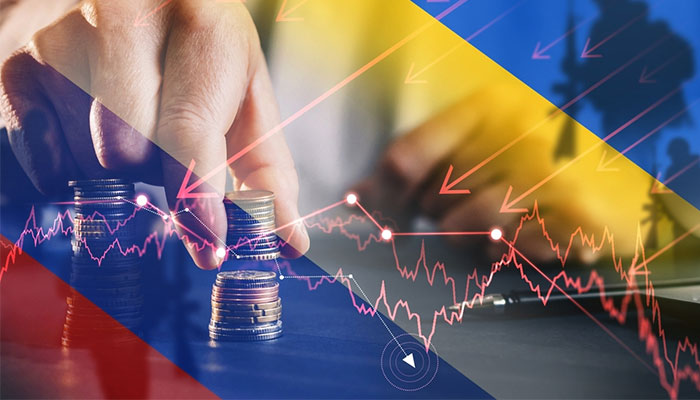The Russian invasion of Ukraine in February was the greatest conventional military offensive since World War II, and it has the potential to trigger a worldwide financial disaster. Geopolitical difficulties, according to CNBC, will cause corporations to reevaluate the concept of globalization. Countries reliant on the region’s plentiful supply of energy, wheat, nickel, and other commodities may face the burden of price rises. As per Sunil Sinha, research director and chief economist at India Ratings, the Russia-Ukraine situation has increased volatility in global trade and would have a consequence on oil and other commodities. Even though India does not have a major exchange of goods with Russia, it can be at great risk of losing economically as a result of supply interruptions created by Western sanctions.
The integration of supply disruptions and the continued terms of trade disruption would likely weigh on GDP, contribute to a quicker rise in inflation, and lead to a larger budget deficit,” said Sonal Varma, chief economist at Nomura Holdings, in a study.
-
OIL CRISIS
Crude oil prices rose during Russia’s invasion of Ukraine, reaching $139 until increasing supply from the United States, Venezuela, and other key producers halted its northward trajectory.
The United States, the United Kingdom, and much of Europe have either banned or opted not to purchase Russian oil. Russia delivers 10-12 barrels of oil for every 100 barrel basket on the worldwide market. Sanctioning Russian oil is almost certain to cause an energy catastrophe, particularly in weak and emerging countries still struggling to recover from the Covid-19 shock. Rising oil prices are a source of concern for India’s economic expansion, even though Russia is not one of the key suppliers.
-
INDUSTRIAL OPERATIONS
Russia has attempted to acquire shuttered foreign industrial operations and place them under state control, forcing multinational firms to face a difficult decision: wait for Russia to stabilize before returning, or build, advertise, and sell things closer to home.
The crisis is also generating a reconsideration of the global economy’s structure, as well as concerns about self-sufficiency. The outbreak has already exposed the flaws of long-distance supply networks based on lean operations.
However, Europe’s reliance on Russian gas is sparking discussions about diversifying energy suppliers, which may further diminish Russia’s position in the global economy. In Russia’s situation, the actual cost “would be corrosive over time, making it much more difficult to conduct business with Russian enterprises and deterring investment.
Russia is a major source of industrial metals such as aluminum, copper, platinum, nickel, and steel. Aluminum, copper, and nickel supply disruptions are a major source of concern for carmakers.
-
FOOD CRISIS
The Russia-Ukraine conflict has impacted food grain, maize, and edible oil supply. If this battle continues, it may cause food insecurity not only in Europe but also in Africa. Several nations rely on Russian-Ukrainian wheat, maize, and other grains, including Turkey and Egypt, which satisfy 70% of their food grain needs from these two countries, and China, which purchases the majority of its maize demand for pigs.
-
GOLD CRISIS
Gold prices rose to a 19-month high last week as a result of the Russia-Ukraine conflict before the two countries’ peace negotiations helped bring prices down.
The majority of India’s gold requirements are met by imports. Experts have warned that if the Russia-Ukraine crisis is not addressed quickly, yellow metal prices might rise over Rs 55,000 per 10 gram. India, on the other hand, purchases about half of the gold produced in Swiss.
-
MICROCHIP CRISIS
The Russia-Ukraine conflict, as well as the sanctions imposed on Russia by the United States and European countries, might lead to a global microchip scarcity catastrophe. During Russia’s invasion of Crimea in 2014, the world witnessed a similar situation. However, the crisis was brief. The supply chain interruptions caused by the Russia-Ukraine war are similar to the supply chain problems caused by Covid. In all circumstances, the evident impact appears to be temporary, although the economic impact may be long-term.
However, the economic impact of Covid-19 must be determined before it can be ‘adjusted.’ Putin’s Ukraine conflict might have a comparable economic impact on Russia and the rest of the globe, with fatalities and destruction in Ukraine offset by long-term damages to the global economy.










